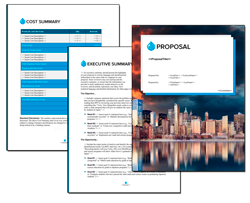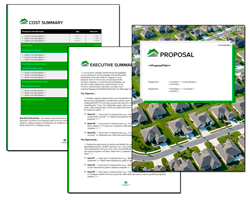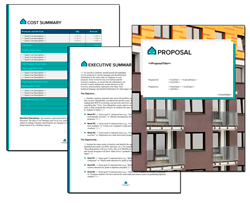
How to Write a Real Estate Proposal: Best Practices and Examples
Learn how to write a real estate proposal that captures client and investor interest. This guide covers the essential elements and structure needed for a persuasive proposal.
Key Takeaways
- A well-written real estate proposal serves as a strategic tool to attract investors and drive property sales by emphasizing recipient needs.
- Key components of a successful proposal include an executive summary, detailed property descriptions, thorough market analysis, and clear financial projections, all structured to persuade potential investors.
- Avoid common pitfalls such as overlooking risks and providing excessive information, as well as ensure that your proposal is reviewed and correctly delivered for maximum professionalism.
The Versatility of Proposal Kit for Real Estate and Property Proposals

Real estate and property proposals encompass a wide array of document types, reflecting the diverse needs within this sector. From detailed business plans to persuasive property sales pitches, comprehensive land development outlines, strategic investment proposals, collaborative joint venture proposals, and internal company projects, each type demands a specialized approach. The versatility of a single Proposal Kit package allows professionals to efficiently create tailored documents suitable for any real estate scenario.
Using Proposal Kit streamlines the proposal creation process, enabling users to seamlessly generate professional, targeted proposals for various real estate opportunities. Whether securing investments, marketing properties, launching new development projects, or initiating strategic partnerships, Proposal Kit offers a robust framework adaptable to all these requirements. Its customizable templates, integrated financial planning tools, and built-in AI writing capabilities facilitate the creation of clear, compelling, and professional documents, significantly enhancing proposal quality and effectiveness.
Understanding the Importance of a Real Estate Proposal
A well-written real estate proposal is more than just a document; it's a strategic tool designed to attract investors, showcase your real estate business plan, and identify lucrative markets in the real estate business. Many best practices used in business proposals - such as clear structure, professional formatting, and persuasive presentation - also apply to real estate proposals. The primary goal of a real estate proposal is to persuade the recipient to take action, thereby unlocking potential opportunities and driving property sales. This essential skill is critical for success in the competitive real estate industry.
The impact of a polished proposal cannot be overstated. It can significantly influence the decision-making of potential partners or investors by enhancing trust and credibility. A well-organized proposal helps the recipient make well-informed decisions, thereby increasing the likelihood of achieving the desired outcomes. Clarity and conciseness are key; a proposal that is easy to read and understand can quickly convey the most important details, ensuring that the reader grasps the key points without feeling overwhelmed.
Focusing on the recipient's needs and tailoring the proposal to address those needs is essential for a successful outcome. Investing in proposal-writing abilities not only enhances the quality of your proposals but also leads to greater success in navigating the competitive real estate landscape.
Ultimately, the quality of your proposal acts as a key factor in its effectiveness, impacting its ability to achieve the desired results. Consulting industry experts and analyzing data can provide valuable insights that enhance your proposal's credibility and effectiveness.
Key Components of a Successful Real Estate Proposal
A successful real estate proposal is structured with several critical elements that provide a clear and persuasive presentation. Following a structured approach ensures clarity and effectiveness, making your proposal more compelling to potential investors. Typically, a real estate proposal includes:
- An introduction
- A cover letter as a brief personal introduction
- A summary of the situation and needs
- Descriptions of the offerings
- Persuasive information to gain trust
The structure generally follows a four-part format:
- Introduction (which often includes a cover letter to set the tone and provide contact information)
- Summary of the situation and needs
- Descriptions of offerings
- Persuasive information, including a comprehensive document
Each section should reflect the specific project and its unique characteristics to enhance its effectiveness.
Executive Summary

The executive summary is the first impression your proposal will make, so it needs to be compelling and concise. Its purpose is to provide an overview of the proposal, highlighting the main points and capturing the reader's attention. Think of it as a snapshot that summarizes all the key components of your proposal, providing a brief overview that outlines the benefits for both parties, including the mission statement.
To write an effective executive summary, it's best to complete it after the rest of the proposal is written. This ensures that you can effectively summarize all the key points. The executive summary should include:
- A brief overview of the project
- The goals
- The benefits
- The mission statement
- The vision statement to establish the company's long-term goals and direction
- Why the investment opportunity is worth considering.
Presenting all the crucial details upfront helps to explain how the reader quickly grasps the value of your present proposal.
Property Details
The property details section is where you provide a comprehensive description of the properties. This includes all the important details, such as location, size, and unique features that will engage potential buyers. A detailed property description should cover the site, exterior, interior, and any unique features that make the property stand out. This section is crucial for helping potential investors or buyers visualize the property and understand its value.
Additionally, summarizing the existing property market is essential. This includes:
- Providing financial analysis, including property assessments to account for prorated expenses such as taxes and association dues at closing
- Sales comparables
- Rent comparables
- Demographic data
Summarizing the market helps educate the client on the property's positioning and sets realistic expectations regarding interest and pricing strategy to sell.
Providing these details ensures the reader has a clear understanding of the property's offerings, explaining them effectively.
Market Analysis
A thorough market analysis is a critical component of a real estate proposal, as it validates the proposal's pricing and timing based on current market conditions. This section should include key components such as:
- Market trends
- Demand
- Competition
- Potential risks
- Specific submarket trends
- SWOT analysis
Understanding demographic trends and economic indicators is also crucial for making informed decisions in real estate.
To enhance the market analysis, use both quantitative data, such as sales figures, and qualitative insights. Offering valuable insights into current market conditions helps potential investors gauge the investment's viability and attractiveness for businesses. A strong market analysis can also help attract investments by showcasing the project's potential and professionalism. This thorough research will make your proposal more persuasive and credible.
Financial Projections

Financial projections are fundamentally important as they illustrate potential return on investment and enhance the overall credibility of your proposal. Detailed forecasts should include revenue, expenses, profitability, and funding needs. The structure of financial projections typically starts with revenue projections over a 3-5 year span, an operating expenses breakdown, and key financial statements such as a cash flow statement, profit and loss statement, and balance sheet.
Including a thorough breakdown of costs, anticipated revenue, and funding requirements showcases the potential profitability of the investment. It is also essential to specify the purchase price of the property and outline the terms and conditions related to the purchase, ensuring all legal and transactional aspects are clear. Additionally, assess various financing options for funding real estate purchasing, such as equity, loans, or partnerships.
Clear and detailed financial projections equip potential investors with the information needed for informed decision-making.
Integrating Your Business Plan and Strategy
Integrating your business plan and strategy is crucial for creating a successful real estate proposal that stands out in the competitive real estate industry. A well-developed business plan provides a clear understanding of your company's mission, objectives, and the strategies you'll use to achieve your goals. By including your business plan within your real estate proposal, you demonstrate to potential investors and partners that you have a solid foundation and a roadmap for success.
A comprehensive business plan should feature a detailed market analysis outlining current trends, opportunities, and potential challenges in the real estate market. It should also include financial projections that highlight expected revenue, expenses, and profitability, giving investors confidence in your ability to deliver results. Additionally, describing your business model and unique value proposition helps set your estate proposal apart from others.
By weaving your business plan and strategy into your real estate proposal, you create a cohesive and persuasive document that showcases your business's strengths and your ability to execute your vision. This integration is a key element in building trust and credibility with potential investors, making your proposal more compelling and successful.
Addressing Property Management and Maintenance

Addressing property management and maintenance within your real estate proposal is essential for demonstrating your commitment to protecting and enhancing the value of the property. A thorough property management plan reassures potential investors that their assets will be well cared for and that the property will remain attractive and profitable over time.
Your real estate proposal should include a detailed description of the property's current condition, highlighting any necessary repairs, renovations, or upgrades. Outline the management structure, specifying the roles and responsibilities of property managers, maintenance staff, and any supervisees involved in the day-to-day operations. This level of detail shows that you have a proactive approach to property management and are prepared to handle any challenges that may arise.
By clearly addressing property management and maintenance, your estate proposal demonstrates your ability to ensure the long-term success and sustainability of the investment. This not only builds confidence with potential investors but also sets your proposal apart as a comprehensive and forward-thinking document.
Creating a Marketing Plan for Your Real Estate Proposal
Creating a marketing plan for your real estate proposal is vital for attracting potential investors and maximizing the property's exposure in the market. A well-structured marketing plan demonstrates your understanding of the real estate landscape and your ability to effectively promote the property to the right audience.
Start by conducting a detailed analysis of your target market, including demographics, current market trends, and a review of similar properties. This information provides valuable insights into who your ideal buyers or tenants are and how best to reach them. Next, outline your marketing strategies and tactics, such as advertising campaigns, social media outreach, public relations efforts, and partnerships with real estate agents.
A comprehensive marketing plan within your real estate proposal should also include a timeline for implementation and metrics for measuring success. By presenting a clear and actionable marketing plan, you show potential investors that you have a strategic approach to generating interest and driving property sales. This not only increases the visibility of your estate proposal but also enhances its appeal to investors looking for a well-thought-out investment opportunity.
Creating a Persuasive Real Estate Proposal

Creating a persuasive real estate proposal involves more than just presenting facts and figures. It's about establishing trust, addressing client concerns, and detailing offers and conditions. To build credibility, highlight your business's strengths, such as unique expertise or resources, that set you apart from competitors. A compelling proposal effectively communicates the opportunity and highlights its potential to secure investor interest. Ensuring the proposal is visually appealing by incorporating design elements that align with your branding can also enhance its effectiveness.
For a real estate agent, strong proposal writing skills are crucial for securing partnerships, investments, or sales. Investing time in research improves the quality of your funding proposal and increases the chances of success. Use straightforward language without jargon or overly complex terms to maintain clarity. Focusing on these elements helps create a standout proposal that persuades the reader to take action.
Know Your Audience
Understanding your audience's needs and preferences is crucial for tailoring your proposal and addressing specific concerns. To enhance the proposal's relevance and effectiveness, consider the following steps:
- Conduct thorough research on your audience.
- Gather information about the party who will judge your proposal.
- Tailor the proposal to their specific needs and situation.
If your audience includes a buyer, gather detailed information on the buyer's responsibilities and requirements - such as proof of insurance, inspections, and utility transfers - to ensure your proposal addresses their unique needs.
The client-centered part of a proposal demonstrates an understanding of the position and needs of the proposal reader. Demonstrating an understanding and concern for the client's needs builds credibility and increases the chances of a positive response.
Highlight Unique Selling Points

Creating a compelling proposal requires brokers to effectively showcase their expertise alongside the services they offer. Including a well-defined features section can significantly influence the attractiveness of a real estate proposal by showcasing what makes the property stand out. Highlighting unique selling points is essential for differentiating your proposal in the competitive real estate market.
Emphasizing unique selling points can lead to a more persuasive marketing plan that captures the attention of potential buyers or investors. Providing valuable insights and outline strategies makes your proposal more compelling and enhances its chances of success.
Use Visual Aids
Visual elements can greatly enhance the understanding of your proposal, as buyers and sellers often skim through documents, focusing more on graphics than text. High-quality images and detailed floor plans can make a real estate proposal more engaging and help potential clients visualize the property effectively. The absence of visual elements can make the proposal less engaging and harder to understand.
Proposal Kit allows for the inclusion of multimedia elements within proposals, enhancing overall engagement. You can make your proposal visually appealing and professional by incorporating the following:
- Images
- Videos
- Logos
- Color schemes
Using visual aids created a more compelling and accessible document that stands out, for example.
Using Proposal Kit for Real Estate Proposals

Proposal Kit streamlines the proposal creation process by providing:
- Customizable templates tailored for various real estate scenarios
- A variety of templates that allow users to efficiently create proposals suited for different real estate transactions, from business plans to funding proposals
- A line item quoting feature, which allows for detailed financial breakdowns in proposals
- An AI Writer that creates tailored first drafts in minutes
In addition to real estate proposals, Proposal Kit can be used to create a wide range of business proposals, helping you present ideas, showcase services, and deliver professional documents for any client or stakeholder.
With the AI Writer, users can enhance their proposal writing, ensuring clarity and professionalism in their real estate proposals. Proposal Kit helps you create a successful real estate proposal by making the process more efficient and effective, allowing you to focus on the content and strategy of your proposal.
Here are some related samples included in every downloadable Proposal Pack
The AI Writer generates a first draft of these templates - customized to your company, client, and project - in just minutes, giving you a head start on editing. Get any Proposal Pack or Proposal Kit Professional, and all of these samples, and the AI Writer are included.
- Retail Location Business Plan Sample
- Commercial Office Real Estate Lease Proposal
- Property Management Services Proposal
- Real Estate Land Development Proposal
- Real Estate Property Sales Services Proposal
- Commercial Real Estate Broker Proposal
- Real Estate Investment Funding Proposal
- Commercial Contracting Office Remodel Proposal
- Custom Home Building Proposal
- DOH Federal Government Grant Proposal
- Environmental Program Sample Proposal
- Energy Efficiency Sample Proposal
- Environmental Cleanup Sample Proposal
- Real Estate Occupancy Sample Proposal
- Franchise Purchasing Sample Proposal
- Case Study Sample
- New Sales Office Sample Proposal
- Architectural Design Sample Proposal
- Non-Smoking Property Management Sample Proposal
- Welding and Fabrication Services Sample Proposal
- Real Estate Agency Listings Sample Proposal
- Commercial Property Rental Sample Proposal
- Call Center Startup Funding Sample Proposal
Here are some related downloadable templates
The AI Writer generates a first draft of these templates - customized to your company, client, and project - in just minutes, giving you a head start on editing. Get any Proposal Pack or Proposal Kit Professional, and all of these templates and the AI Writer are included.
- Architectural Design Proposal Template
- Architectural Design Proposal
- Architecture Firm Proposal Template
- Architecture Proposal Template
- Business Lease Proposal Template
- Commercial Lease Proposal Template
- Commercial Multifamily Real Estate Investor Proposal Template
- Commercial Office Real Estate Lease Proposal
- Commercial Property Management Proposal Template
- Commercial Property Rental Proposal
- Commercial Property Sales Proposal
- Commercial Real Estate Broker Proposal
- Commercial Real Estate Proposal Template
- Computer Business Center Startup Funding Proposal
- Condominium Complex Amenities Proposal
- HOA Property Management Proposal
- Home Buyback Proposal Template
- Lease Agreement Proposal Template
- Letter of Intent for Real Estate
- Non-Smoking Property Management Proposal
- Property Management Services Proposal
- Real Estate Agency Listings Proposal
- Real Estate Agency Services Proposal
- Real Estate Conversion of Apartments to Condos Proposal
- Real Estate Flipping Investment Proposal
- Real Estate Investment Funding Proposal
- Real Estate Investment Prospectus Proposal
- Real Estate Land Development Proposal
- Real Estate Multi-Building Investment Proposal
- Real Estate Occupancy Proposal
- Real Estate Property Sales Services Proposal
- Real Estate Resort Development Sales Proposal
- Lease Proposal Template
Proposal Kit Professional Features
Proposal Kit Professional offers advanced features that enhance the proposal creation process. The software provides content that is essential for real estate proposals. Custom branding options are also available, allowing you to personalize proposals and improve their professional presentation.
Using the advanced features of Proposal Kit Professional helps create more comprehensive and polished proposals. These features help you address all aspects of your real estate transactions, from detailed requirements to branding, ensuring your proposals are both effective and professional.
Step-by-Step Guide to Using Proposal Kit
Creating a proposal using a real estate proposal template from the Proposal Kit starts with selecting a template that aligns with your specific real estate transaction type. Once you've chosen the appropriate template, the next step involves filling in the template with detailed property information, including pricing and terms, to meet client expectations.
The proposal creation process can be enhanced by using line item quoting for detailed project estimates. Following these steps helps create a professional and comprehensive real estate proposal that meets client needs and stands out in the competitive market.
Common Mistakes to Avoid in Real Estate Proposals
Overlooking potential risks can make a proposal appear overly optimistic and unrealistic. It's important to address and mitigate potential risks within the proposal to provide a balanced and realistic view of the investment opportunity. Failing to customize the proposal can lead to it feeling generic and unconvincing, which can be a major turn-off for potential investors.
Including too much information can overwhelm the reader and detract from the key points of the proposal. Focus on clarity and conciseness to ensure the most important details are easily understood so you can feel confident.
To keep your proposals up-to-date and effective, make sure to review them semi-annually and adjust as needed.
Avoiding these common mistakes results in a more effective and persuasive real estate proposal.
Finalizing and Delivering Your Proposal
Thoroughly reviewing and revising your proposal is crucial to ensure accuracy and clarity. Neglecting to proofread can result in errors that harm the proposal's professionalism.
Preparation for delivery involves:
- Choosing the appropriate method, such as printing or saving as a PDF.
- Finalizing your proposal.
- Including clear contact information to keep the conversation flowing smoothly between you and the recipient.
- Scrubbing old dates and names from reused content.
- Delivering your proposal correctly to ensure it reaches the recipient in the best possible format.
Review and Revise
Reviewing and revising the proposal for accuracy and completeness is vital for enhancing its effectiveness. A thorough review helps clarify objectives and align the proposal with the expectations of its intended audience. Utilizing feedback from colleagues or mentors can greatly improve the quality of your proposal during the review process.
Project management tools can help organize research and writing, making the review process more efficient. Utilizing proofreading services can help identify overlooked errors in your proposal and support the development of your project.
A careful, regular review and revision process before submission can significantly enhance the professionalism and impact of your proposal.
Delivery Options
You can deliver your proposal by printing it out, saving it as a PDF, or using both methods depending on your relationship with the recipient. Selecting a delivery method may vary based on the preferences and expectations of the recipient you are addressing.
Ensuring a professional finish, users can easily share their completed proposals digitally or print them for delivery to clients.
Summary
In conclusion, writing a successful real estate proposal involves understanding its importance, including key components, and utilizing tools like Proposal Kit to streamline the process. By focusing on clarity, addressing client needs, and avoiding common pitfalls, you can create compelling proposals that stand out in the competitive real estate market. Mastering these skills will not only enhance your professional credibility but also increase your chances of closing more deals.
 Proposal Kit Professional provides the most content, including legal contracts and a free design theme pack. Plus, advanced software features include custom branding and customizable quoting databases.
Proposal Kit Professional provides the most content, including legal contracts and a free design theme pack. Plus, advanced software features include custom branding and customizable quoting databases. Proposal Pack for Any Business covers this type of proposal and includes samples. There are also some commonly used specialty design themes available:
Proposal Pack for Any Business covers this type of proposal and includes samples. There are also some commonly used specialty design themes available:Photo Design Proposal Packs
 Proposal Pack Architecture #3
Proposal Pack Architecture #3 Proposal Pack Architecture #4
Proposal Pack Architecture #4 Proposal Pack Construction #6
Proposal Pack Construction #6 Proposal Pack Decorator #3
Proposal Pack Decorator #3 Proposal Pack Decorator #4
Proposal Pack Decorator #4 Proposal Pack HVAC #2
Proposal Pack HVAC #2 Proposal Pack Painter #4
Proposal Pack Painter #4 Proposal Pack Plumbing #2
Proposal Pack Plumbing #2 Proposal Pack Real Estate #5
Proposal Pack Real Estate #5 Proposal Pack Real Estate #6
Proposal Pack Real Estate #6 Proposal Pack Real Estate #7
Proposal Pack Real Estate #7 Proposal Pack Real Estate #8
Proposal Pack Real Estate #8 Proposal Pack Roofing #2
Proposal Pack Roofing #2 Proposal Pack Skyline #4
Proposal Pack Skyline #4 Proposal Pack Skyline #5
Proposal Pack Skyline #5 Proposal Pack Symbols #11
Proposal Pack Symbols #11
Line Art Design Proposal Packs
 Proposal Pack Architecture #1
Proposal Pack Architecture #1 Proposal Pack Architecture #2
Proposal Pack Architecture #2 Proposal Pack Decorator #1
Proposal Pack Decorator #1 Proposal Pack Decorator #2
Proposal Pack Decorator #2 Proposal Pack HVAC #1
Proposal Pack HVAC #1 Proposal Pack Industrial #1
Proposal Pack Industrial #1 Proposal Pack Real Estate #1
Proposal Pack Real Estate #1 Proposal Pack Real Estate #2
Proposal Pack Real Estate #2 Proposal Pack Real Estate #3
Proposal Pack Real Estate #3 Proposal Pack Real Estate #4
Proposal Pack Real Estate #4 Proposal Pack Roofing #1
Proposal Pack Roofing #1 Proposal Pack Skyline #1
Proposal Pack Skyline #1 Proposal Pack Skyline #2
Proposal Pack Skyline #2 Proposal Pack Skyline #3
Proposal Pack Skyline #3
Frequently Asked Questions
What does Proposal Kit Professional provide?
Proposal Kit Professional provides comprehensive content such as legal contracts, advanced software features, and customizable branding options to enhance your proposals.
How should you deliver your proposal?
Deliver your proposal in a format that suits your relationship with the recipient; consider printing it out or saving it as a PDF. This ensures professionalism and accessibility.
What is the purpose of knowing how to write a real estate business proposal?
Knowing how to write a real estate business proposal is essential for competing effectively and successfully closing more deals in the industry. A well-structured proposal can set you apart and attract potential clients.
What are some standard sections included in a proposal?
A well-structured proposal typically includes an introduction, a summary of the situation and needs, detailed descriptions of the proposed ideas or services, and persuasive information to establish trust. Including these sections ensures clarity and effectiveness in communicating your objectives.
What should you do before writing a proposal?
Before writing a proposal, it's essential to gather information about the audience to tailor the content to their specific needs and preferences. This targeted approach will enhance the proposal's effectiveness and relevance.



 Cart
Cart
 Are you just looking for a template, sample, or software for your real estate proposals? Click these links to skip down the page and get right to it.
Are you just looking for a template, sample, or software for your real estate proposals? Click these links to skip down the page and get right to it.

 Facebook
Facebook YouTube
YouTube Bluesky
Bluesky Search Site
Search Site